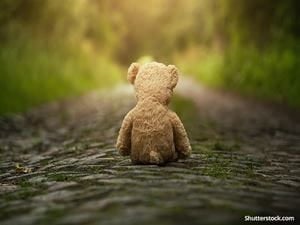
The passing of a child is an unspeakable loss.
It is an unnatural thing for so young a life to end. It violates the natural cycle of the old stepping aside, making way for the young as they mature. For those of us who haven’t experienced this loss, the very idea of it is the emotional equivalent of reaching the top of a staircase in the darkness and thinking that there is one more stair—but in a moment of bewilderment that makes the stomach drop for half a second, finding that there isn’t. It feels wrong in a way that can’t be adequately explained with words like “pain” and “sad” and “grief.”
These words are mere ink on paper. They’re vibrations of the air, symbols of something bigger. But for the bereaved parents these children leave behind, this bigger reality is far worse than anything we can imagine.
Nisha Zenoff, Ph.D. is intimately acquainted with this loss.
Her son’s name was Victor, and he was 17 years old when he died in a hiking accident in Yosemite in 1980. In another week, he would have been 18.
Zenoff’s journal reflects the months after Victor’s death. “The pain is too great,” she wrote. “I can’t take a full breath. There is a fire in my gut that feels like it will never stop burning. I beg for the fire in me to be snuffed out.”
For many, the loss of a child truly does snuff them out. Sometimes, this means a lifetime of silent suffering, of depression and anger and pain and the ultimate loss of the self. For others, this snuffing is made literal in early death.
Everyone who goes through such agony is presented with a choice. They can make their pain their prison, or they can make it their platform. For many, pain is prison, and they are not to be judged for this. Nisha Zenoff is unusual. She chose to make it her platform.
Her book, “The Unspeakable Loss,” is the result of her pain given direction. A professional therapist and grief counselor, Zenoff made a vow to herself. If she survived the loss of her son, she “would learn as much as possible about how other bereaved parents find their way,” she writes, “and share that knowledge with others.”
And so she did. Her journey transformed her in a positive way. It can do the same for you.
“The Unspeakable Loss” deals with the issues of immense loss in series of simple questions. There’s nothing complex here, no impassible walls of intellect or knowledge. You bring your pain to the table, and Zenoff uses her unique experience as both counselor and bereaved mother to help you.
Let’s look now within the pages and have a glimpse of what lies within.
Will my tears ever stop?
If you’ve lost a child, it can seem like your grief will be an everlasting fire, and that the tears will never end. Everything from quiet moments to loud sounds to the gentle touch of a concerned relative will bring forth the flood.
Zenoff is here to tell you to let those tears flow.
“You may not want to talk with friends or even go to the grocery store,” she writes, “because the smallest reminder brings a torrent of tears.”
But when Zenoff asked her friend Pamela, whose daughter had been lost to suicide, what helped her, Pamela simply replied that she had to allow herself the time to grieve. “If you feel like wailing, wail,” she said.
Let the pain move through you so that it can run its course. But above all, as you grieve, have compassion for yourself. Never berate yourself or think yourself weak for grieving. It’s only natural. The release is needed.
“There will come a time,” writes Zenoff,” when you can choose your moments of tears.” They’ll cease to be constant. But until then, realized that while you have no control over the existence of grief in your life, you can control what you do with it.
How can we cope with the changes in our family?
A death is like a rock hitting a windshield. Webs of cracks spread out in all directions, like a spider’s web. When death enters a family, everyone is touched by those cracks, and sometimes, everything can shatter.
Zenoff writes that “roles that were established over many years may shift,” within a family after the death of a child. The order of children may change, and balance is disrupted. Activities normally initiated by the now-absent child may no longer occur.
To best help your family cope with the loss, it’s helpful to find out exactly what each member lost. A sibling might have lost a best friend. A father may have lost the young reflection of himself. It varies.
With time, find ways to fill that void. This isn’t callous—you’re not forgetting your child, but filling those empty spaces within your family that might otherwise tear it apart.
Try to maintain continuity, as well. If your family did certain things, took vacations in certain places, or engaged in certain traditions before your tragedy, try to continue doing these things. Don’t let life stop. Don’t let it stagnate.
Overall, pay close attention to how each member of your family does in the ensuing months and years, and provide comfort and togetherness wherever you can. This will help you all move forward together, finding strength in one another.
How do we keep our child as part of our family?
As a friend of Zenoff’s said, “A child dies a second time when no one speaks their name.” Although it may be difficult, keeping your deceased child in your life by inclusion in conversation, mourning, and celebrations of life.
Keep your child in your thoughts and words, and he or she will always be a part of your family.
Speaking and remembering is a form of healing, says Zenoff. “You remember who they were and are to you, their essence that you value and love so deeply.”
Some think that to heal, you must “let go” of a loved one, striking his or her name from your vocabulary and memory as best you can. But this isn’t healing. This is a second loss.
Go through old photos and put together a picture book to celebrate your child’s life. Tell stories about their life, how they made you laugh, and what they loved.
Let them continue to inspire you.
It may sound cliché to say that a loved one who has passed on can live on in your heart, but this is absolutely true. Continue to include your child in your life, and you’ll be better equipped to move forward.
A Different Life
Zenoff’s journey is one filled with immense pain, but with that pain came understanding. Although no two griefs are alike, anyone who has suffered this unspeakable loss can come away from her book with the right tools to make it through their own experience.
The truth is this: you’ll never be the same. But that’s not a bad thing. It’s just a different thing. You’ve been, as Zenoff says, “thrust into a new life.” You’ve been reshaped.
Remember this. You control the shape you’ll take as you move through your path of grief. Choose to allow both hope and help, and one day, you’ll suddenly realize that you feel whole again. The fire will be embers—still radiating heat, but not burning any longer.
But until you reach that point, now this: you are not alone. Seek peace, life, and love, and know that there are many who will take your hand and help you back into the light.

